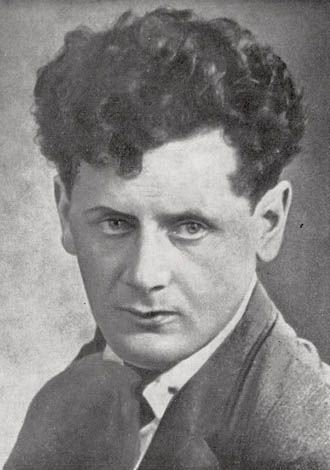Markish, Perets
Markish, Perets or Peretz [Маркіш, Перец], b 7 December 1895 in Polonne, Novohrad-Volynskyi county, Volhynia gubernia, d 12 August 1952 in Moscow. Soviet Yiddish poet, novelist, and playwright. Markish received a traditional Jewish education but left home early to seek opportunities. He sang in the Berdychiv synagogue and attempted to pass his gymnasium exams in Odesa, supporting himself through odd jobs. In 1916 he was drafted into the tsarist army, where he was wounded and met the February Revolution of 1917 in hospital. Following his demobilization at the end of 1917, Markish moved to Katerynoslav to live with his parents. The revolution left a profound impact on his poetic work, leading him to publish his first Yiddish poems in a socialist journal Der Kemfer. In 1918–19, he gained recognition with his works appearing in Yiddish modernist journals, such as Eygns and Baginen of the Kyiv-based Kultur Lige. Together with David Hofstein and Leib Kvitko, he formed the so-called Kyiv lyric triad of Yiddish poets. In 1919 he published his first book of poetry, Shveln (Thresholds).
In 1920, Markish relocated to Moscow and started working for the Communist Party’s Yiddish-language newspaper, Der Emes, as a contributor and translator. During his time in Moscow, his apartment became a meeting place for the burgeoning local Yiddish cultural community. In 1921 Markish and other writers formed the Moscow Circle of Jewish Writers and Artists, with several of them establishing modernist Yiddish journal Shtrom.
During his time in Moscow, Markish penned two significant poems that left a lasting impact on Yiddish literature. The first, titled ‘Volyn’ (Volhynia, 1921), artfully portrayed life in a Jewish shtetl in Ukraine, avoiding idealization while imbuing the narrative with a subtle touch of nostalgia. The second poem, titled ‘Di kupe’ (The Heap, 1922), bore witness to Markish’s deeply felt bitterness over the anti-Jewish pogroms that transpired during the tumultuous years of 1919–20.
Between 1921 and 1926 Markish lived in Poland and France. While in Warsaw, he co-edited the expressionist literary anthology Khalyastre (The Gang; 1922) alongside Uri Zvi Greenberg and Melech Ravitch. The anthology’s second volume was published two years later in Paris. After his return to the USSR in 1926, Markish largely conformed to socialist realism and began writing about industrialization, collectivization, and various aspects of life in the Soviet Union. He became a prominent figure in the Soviet Jewish literary establishment and contributed extensively to the Kharkiv-based literary journal Di Royte Velt and, to a lesser extent, to the Minsk-based literary journal Shtern and the newspapers Der Shtern and Oktiabr. In 1929, he published his first novel, Dor-oys, dor-ayn (A Generation Leaves, a Generation Comes), which revolved around a Jewish family’s life during revolutionary years of 1917–20. In the 1930s, he ventured into playwriting, and many of his plays were produced in Soviet Jewish theaters.
During the purges and Yezhov terror of 1936–38, Markish composed a poem fiercely denouncing defendants at one of the purge trials. This publication solidified his position within the Soviet establishment, as a result of which he was awarded the Order of Lenin in 1939. From 1939 to 1943, he chaired the Yiddish section of the Soviet Writers’ Union. In 1942 Markish became a card-carrying member of the Communist Party of the Soviet Union and, throughout the war, he served on the board of the Jewish Anti-Fascist Committee (JAFC), a committee created to rally international Jewry in support of the Soviet struggle against Nazi Germany. Alongside David Bergelson and Isaac Fefer, he was one of the most widely known Yiddish writers in the USSR.
Despite his many administrative responsibilities, Markish continued to write prolifically during the Second World War. His early wartime works were published in small pamphlets by the Der Emes publishing house. He was also a regular contributor to the JAFC’s newspaper, Eynikayt. One of his last major published works was a long poem ‘Milkhome’ (War, 1948).
However, during the postwar Stalinist purges of Jewish culture in the Soviet Union, Markish was arrested in 1949, imprisoned, and subjected to torture. On 12 August 1952 he and a number of other members of the JAFC were convicted of anti-Soviet activities, spying, and bourgeois nationalism. He was executed in the Lubianka Prison in Moscow during what is sometimes referred to as ‘the Night of the Murdered Poets.’ He was posthumously ‘rehabilitated.’
Markish’s books Narechenyi zaviriukhy (The Bridegroom of the Blizzard, 2000), Vybrane (Selected, 2002), and Kupa (The Heap, 2015) were published in Ukrainian, translated by Valeriia Bohuslavska. In 1998 the Markish Memorial Museum was established in the former premises of the main choral synagogue in Polonne.
BIBLIOGRAPHY
Rubenstein, J.; Naumov V. (eds). Stalin’s Secret Pogrom: The Postwar Inquisition of the Jewish Anti-Fascist Committee (New Haven 2001)
Sherman, J.; Estraikh, G.; Shneer, D.; Finkin, J. (eds). A Captive of the Dawn: The Life and Work of Peretz Markish (1895–1952) (Leeds 2011)
Antolohiia ievreis'koï poeziï. Ukraïns'ki pereklady z ïdyshu (Kyiv 2011)
Larysa Bilous
[This article was written in 2023.]
.jpg)
.jpg)
